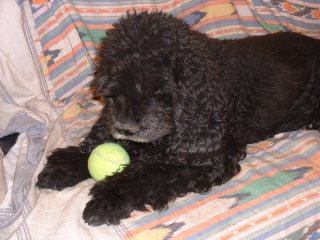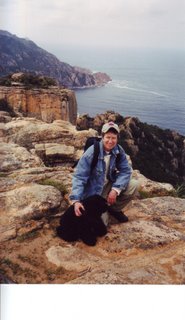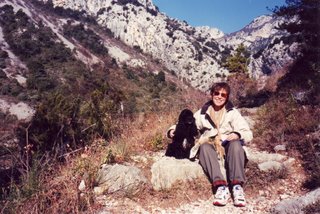 Milou was a beautiful black American Cocker Spaniel. He was bred at one of the top kennels in Switzerland and lived in Monte Carlo with an Italian lady who'd lived in Brazil for so long that she often spoke to Milou in Portuguese. Milou, sophisticated dog that he was, understood Italian, English, French and Portuguese.
Milou was a beautiful black American Cocker Spaniel. He was bred at one of the top kennels in Switzerland and lived in Monte Carlo with an Italian lady who'd lived in Brazil for so long that she often spoke to Milou in Portuguese. Milou, sophisticated dog that he was, understood Italian, English, French and Portuguese.One day in 1993, when Milou was three years old, he was brought to me by Madame Dana’s chauffeur. He booked him in for ‘about a month’ as Madame had to go into the Princess Grace Hospital in Monaco for an operation. The month became a year and eventually it became obvious that Madame wasn’t going to recover. During that year, I visited her in Monaco on two or three occasions, but she would never allow me to bring Milou, saying it would upset her too much. She enjoyed, though, seeing the photos I brought along of Milou playing with other dogs.
Pierre, the chauffeur – he was a retired Monaco policeman – came over once a week and took Milou for a walk. Milou adored Pierre and went crazy with excitement when he rang the doorbell. Of course it wasn’t necessary for him to take Milou for walks but Madame wanted a report on his welfare.
One day, Pierre told me that Madame Dana was dying and that it was written into her will that any pets should be put to sleep on her death. I told him there was no way I’d ever allow this – a beautiful healthy young dog – no way, José! Fortunately, a month or so before Madame passed away, she allowed me to adopt Milou. He was four and a half by then and spent every available minute playing with a tennis ball. He was already, in my mind, 'my' dog and so, happily for me, he never left. After Madame died, Pierre, whom Milou adored, never came back and never even phoned to ask how he was doing.
Milou was such a happy little dog, always fun, always ready to play, took such joy in life, a terrible thief for food - chairs had to be tucked under the table else he’d be up there, finishing off the leftovers, or worse, eating our dinner before we had time to sit down. At biscuit time each night, he’d fix me with ‘that look’ (long before bedtime) telling me it was ‘time for my biscuit and NOW please.’
When we lived in Roquebrune, his favourite game was to nose a tennis ball into the pool and then bark and bark until someone got it out for him. We had wonderful adventures and outings. He loved going to restaurants, his favourite being Le Balico in Menton where the waiters always found a biscuit for him and put a water bowl under the table. He visited Avignon and Moustiers-Ste-Marie and toured all around Corsica one spring, leading Candy and me up the rugged mountains like the little trouper he was - and he always loved his trips to Italy.
Milou’s temperament was exceptional, accepting as he did all the dogs who came en pension. He cuddled up to his Labrador house-mate, Flavia, and he was loved by everyone, especially his bed-buddy Candy, who shared her bed with him whenever she visited from America and never forgot to pack a tennis ball in her luggage. Milou could smell a tennis ball from a mile away!
In May 2005, just one day short of his 15th birthday, Milou went to doggy heaven. He is buried on the hillside under a beautiful rose and tucked up with his favourite tennis ball, his last gift from Candy. I've been lucky to have shared my life with many wonderful dogs including so many beautiful and much-loved Old English Sheepdogs but Milou was the 'dog of my life’ and, of course, Pension Milou was named for him.
I’ve often wondered why Milou, of all the dogs I’ve owned and loved, was so special. Perhaps it was because he shared most of the years in France with me, years that weren’t so easy at the beginning. Perhaps because after all the years with many Old English Sheepdogs, he was the only dog and so we grew close. When you have lots of dogs I think they interact as much with each other as with their owner. But really I think it’s because he was such an exceptional dog – always happy. He made me laugh out loud at his antics. It was impossible to be sad around him – he kept me going. And he was a kind, unselfish dog. I learned a lot from Milou and dammit, I miss him still.
On the opposite side of the valley to where I live there is a wide track cut into the forest to allow fire engines through in times of fire. It’s been designated a nature walk so is closed off to all cars and bikes. Many people walk their dogs along this track – it goes from Gorbio tennis courts all the way down the valley towards the Mediterranean, cuts around and ends up at Roquebrune tennis courts but it’s a long walk and there is nowhere to take a rest en route.
Soon after Milou’s death I asked the Maire of Gorbio if I could buy a bench for walkers in memory of Milou and asked if I could put an inscription on it. The Mayor chose a rustic bench made of halves of tree trunks, which suited the environment. He asked if I liked it and I did. He told me he’d be happy to burn any words I chose into the wood. This was in May 2005. Six months later he told me the bench had been ordered. A few months after that, he told me it had arrived but that he had yet to do the engraving. Earlier this year he stopped and said Bonjour whilst I was eating at a table outside the Beau Sejour restaurant in the village. He told me the bench had been engraved but he was waiting for someone to install it. You don’t hurry things in France!
The inscription gave me a dilemma. I’ve always loved a particular Milun Kundera quotation but it was far too long – even if I’d just used the final sentence:
Etre assis avec un chien à flanc de côteau par un belle après-midi ensoleillé rencoit a l’Eden – où ne rien faire n'était pas ennuyeux - c'était la paix ~Milan Kundera.
How could I expect anyone, even our wonderful Mayor, to engrave that lot on the back of a bench? Here’s the full quotation in English. I love it. Don’t you?
Dogs are our link to paradise. They don't know evil or jealousy or discontent. To sit with a dog on a hillside on a glorious afternoon is to be back in Eden, where doing nothing was not boring-- it was peace." Milan Kundera
I needed to think of something else and I remembered an Edith Wharton quotation that seemed right. I sent both and told him he could decide which one to use.
Last week, at the Fête de la Branda, the Mayor asked me if I’d seen le banc and cheekily told me it had been in place a year. I reminded him I’d asked him about it only this last Spring. ‘Oh well,’ he said, ‘perhaps six months.’ So, finally, my Milou’s bench is in place. I must go and see it.
It’s a beautiful morning and Sheila, my friend from the village, is driving down with her dog, Taco. She picks me up by the mailbox at the top of my track. Beau, the refuge dog, comes too. We drive around to the other side of the valley and park. After the rains, small piles of rocks have fallen onto the track, pine cones are underfoot along with the spiky coverings of conkers from a lone horse chestnut tree. I didn’t know they grew in the south of France. The path twists and turns as it descends towards the Mediterranean so that we can’t see much ahead of us until we round each bend. Then, suddenly, we see the bench. Tucked into a small lay-by, it looks down towards the sea.
It’s perfect. I read the inscription:
To Milou 1990 – 2005 “My little dog: a heart-beat at my feet” ~ Edith Wharton
Well actually the Mayor missed out colon and left the ‘H’ out of Wharton but hopefully she’ll forgive us – and Milou never could spell properly.
 Yes, this is good. Milou would like this bench and so do I. I sit on it and pose for a photo with Beau. We start to walk back to the car but then I remember. I walk back, take an old tennis ball out of my pocket and place it carefully under the bench…
Yes, this is good. Milou would like this bench and so do I. I sit on it and pose for a photo with Beau. We start to walk back to the car but then I remember. I walk back, take an old tennis ball out of my pocket and place it carefully under the bench…























